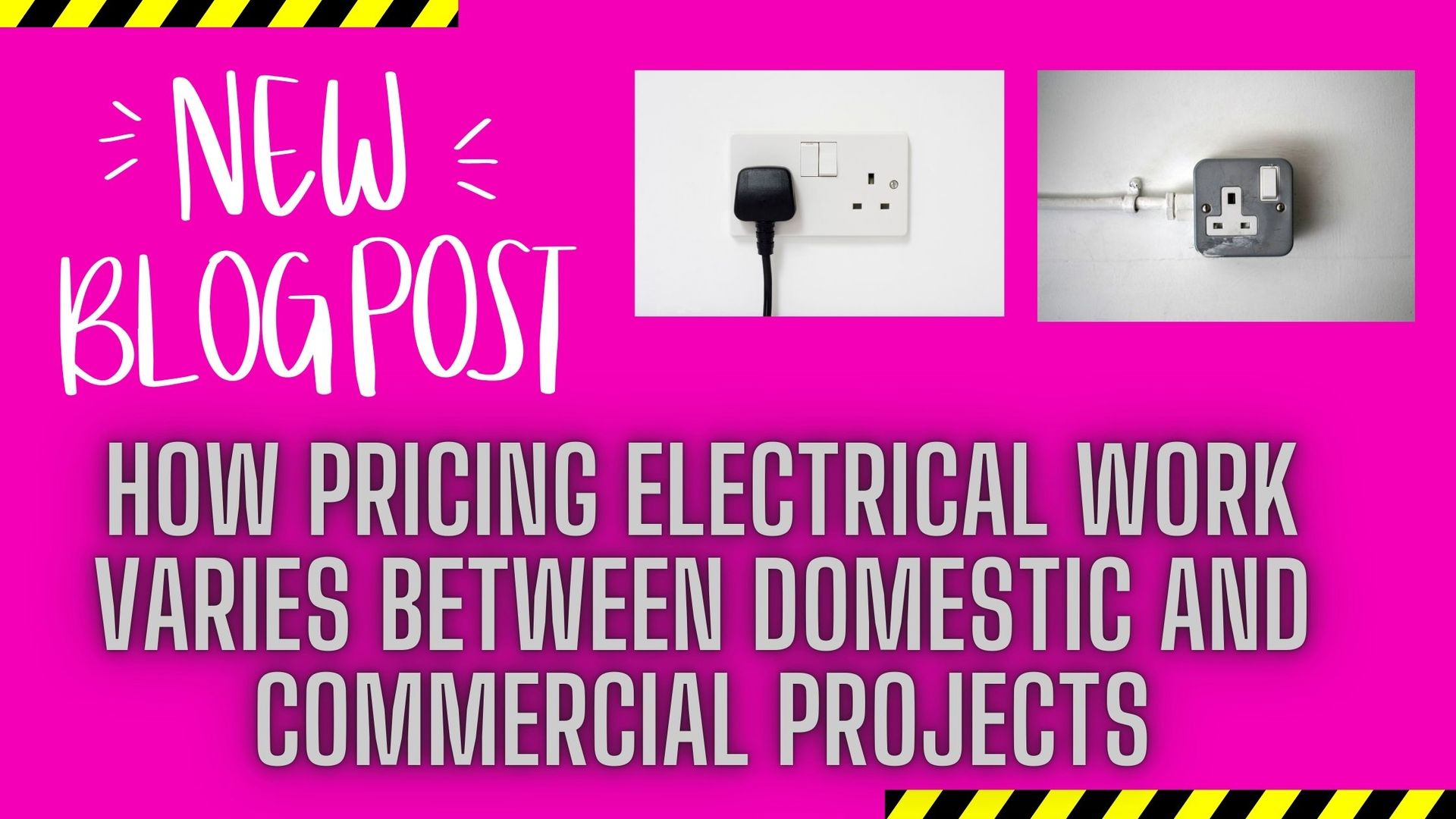How Pricing Electrical Work Varies Between Domestic and Commercial Projects

When planning electrical work—whether for your home or business—one of the first questions that comes to mind is: How much will it cost? While both domestic and commercial electrical work require expertise and high safety standards, pricing can vary significantly. But why?
In this guide, we'll break down the key differences in pricing between domestic and commercial electrical projects, helping you understand what to expect and how to budget effectively.
1. Scale of Work: Bigger Spaces, Bigger Budgets
One of the most obvious differences between domestic and commercial electrical work is scale.
🏡 Domestic Projects:
- Typically involve smaller spaces (e.g., homes, apartments)
- Work may include rewiring a room, upgrading a consumer unit, or installing extra sockets
- Generally, take less time to complete
🏢 Commercial Projects:
- Cover larger premises like offices, retail spaces, and warehouses
- Often require higher-capacity electrical systems to handle increased power loads
- Can include three-phase power installations, security systems, emergency lighting, and data cabling
- Tend to take longer and require more electricians on-site
💰 Impact on Price: commercial jobs usually involve more materials, labour, and planning, making them more expensive overall.
2. Complexity of Electrical Systems
🔌 Domestic electrical systems are relatively straightforward, designed to power standard appliances, lighting, and heating.
⚡ Commercial electrical systems, however, need to support higher power demands, specialist equipment, and multiple workstations. They may also require:
- Three-phase power systems for industrial machinery
- Backup generators and UPS systems
- Complex lighting and security systems
💷 Impact on Price: The added complexity of commercial electrical systems means higher costs for materials and specialised labour.
3. Compliance & Certification Requirements
Both domestic and commercial electrical work must meet strict UK regulations, but commercial projects often come with additional legal requirements.
✅ Domestic Electrical Work: must comply with Part P of the Building Regulations, ensuring all electrical work is safe and legally certified.
🏢 Commercial Electrical Work:
- Must meet Health and Safety at Work regulations
- Requires regular electrical inspections and maintenance (EICR reports are often legally required)
- May need fire safety compliance such as emergency lighting and alarm systems
📜 Impact on Price: more paperwork, testing, and compliance requirements in commercial settings contribute to higher costs. See our blog Hiring An Electrician In Swindon - 5 Questions To Ask for further information.
4. Materials and Equipment Used
Commercial electrical installations often require heavy-duty materials that can handle higher electrical loads and longer operating hours.
🔹 Domestic Materials: standard consumer units, household wiring, residential-grade sockets and switches.
🔸 Commercial Materials: industrial-grade wiring, metal trunking, commercial-grade distribution boards, and reinforced cable containment systems.
🛠️ Impact on Price: the use of higher-spec materials for commercial projects increases overall costs.
5. Labour Costs and Expertise
Commercial electricians often require additional qualifications to work on complex systems, which can result in higher labour rates.
👷 Domestic Work:
- Often carried out by one or two electricians
- Typically charged at an hourly rate or per project
🏗️ Commercial Work:
- May require a team of electricians
- Involves project management and coordination
- Can include after-hours work (to avoid business disruptions), which increases costs
⏳ Impact on Price: more specialist skills, extended working hours, and additional labour contribute to higher pricing for commercial projects.
6. Project Timelines and Business Disruptions
In commercial settings, electrical work must be planned around business operations to avoid disrupting daily activities.
📅 Domestic work can often be scheduled at any time without major inconvenience.
🏢 Commercial work might need to be carried out overnight or on weekends, leading to higher costs for out-of-hours labour.
⏰ Impact on Price: the need for flexible scheduling and faster turnaround times in commercial projects can drive up costs.
7. Maintenance & Ongoing Costs
Domestic electrical work is often a one-off cost, with occasional inspections.
Commercial electrical work, however, often requires ongoing maintenance contracts to ensure compliance and system reliability.
🛠️ Planned electrical maintenance for businesses can include:
- Routine EICR inspections
- Emergency lighting tests
- PAT testing of electrical equipment
💷 Impact on Price: businesses need to budget for ongoing electrical maintenance, whereas homeowners usually pay for one-off installations.
Key Takeaways: Why Pricing Differs
💡 Domestic Electrical Work:
✅ Lower overall cost
✅ Standard materials and labour rates
✅ Shorter project timelines
💡 Commercial Electrical Work:
🚀 More expensive due to larger scale
🚀 More complex systems & compliance requirements
🚀 Higher-grade materials and extended labour needs
🔎 Are you planning electrical work for your home or business? Crannis Technology Services Ltd offers expert electrical services across Swindon, ensuring safety, compliance, and reliability.
📞 Contact us today on 01793 629629 for a tailored quote!




